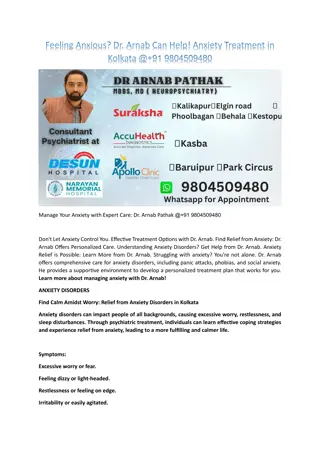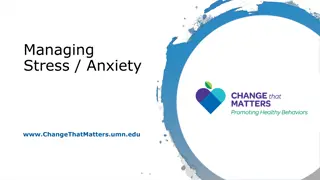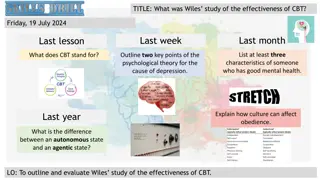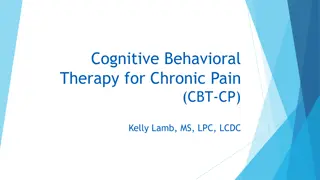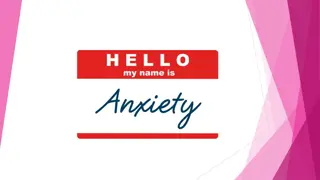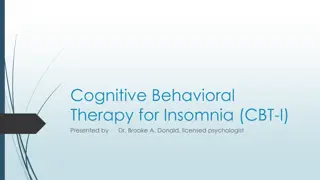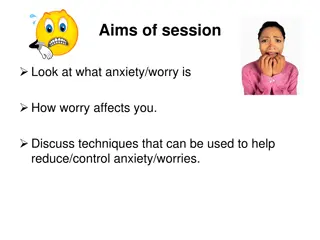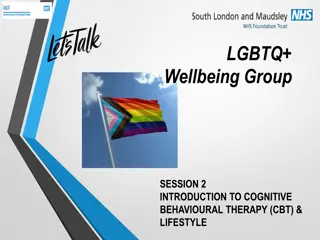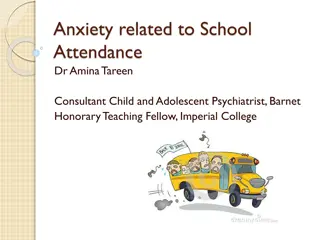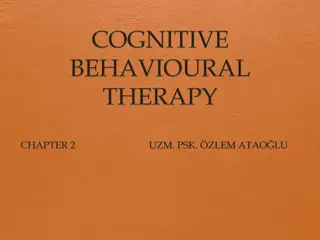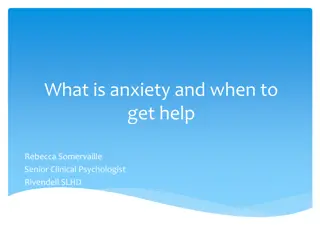Understanding Cognitive Behavior Therapy (CBT) Techniques for Managing Anxiety
Cognitive Behavior Therapy (CBT) is a therapy approach that focuses on behaviors, cognitions, and emotions to help individuals navigate and view themselves, others, and the world. It involves challenging negative thoughts, understanding anxiety triggers, and recognizing distorted thinking patterns to manage anxiety effectively.
Download Presentation

Please find below an Image/Link to download the presentation.
The content on the website is provided AS IS for your information and personal use only. It may not be sold, licensed, or shared on other websites without obtaining consent from the author. Download presentation by click this link. If you encounter any issues during the download, it is possible that the publisher has removed the file from their server.
E N D
Presentation Transcript
What is cognitive behavior therapy (CBT)? A type of therapy that focuses on one s behaviors, cognitions, and emotions and how that influences how we navigate and view ourselves, others, and the world. Today you ll learn skills to manage unwanted thoughts from a cognitive behavioral approach.
Cognitive behavior cycle What we THINK affects how we ACT and FEEL How we FEEL affects what we THINK and DO What we DO affects how we THINK and FEEL
Skill: Challenging anxious or negative thoughts Why challenge thoughts? Thoughts are not always true. Thoughts are not facts. Thoughts can be subjective. Thoughts can be biased by past experiences or by what we hear, read, or see. Our thoughts are VALID and REAL, but that doesn t guarantee they are an accurate representation of the truth. Our thoughts can produce unwanted feelings and actions such as anxiety.
Understanding anxiety Anxiety is a common emotion that can be helpful/adaptive in various situations. However, once your body knows and understands anxiety, your body will often be triggered to create feelings and physical reactions even amid a situation that isn t life threatening.
Describe a common situation that triggers your anxiety Ex: Giving a speech in front of a crowd or driving in rush hour traffic
Understanding anxiety Anxiety distorts our thinking by causing us to overestimate the likelihood of something going wrong and imagine the potential consequences as worse than they really are. Sometimes, just taking a moment to think about these facts can help us recognize our irrational thoughts.
Imagine youre faced with the anxiety-producing situation from the previous slide. Describe the Worst outcome: Best outcome: Likely outcome:
Imagine the worst outcome comes true. Would it still matter 1 week from now: 1 month from now : 1 year from now :
Working through anxiety Usually, anxious thoughts focus on the worst possible outcomes, even when they aren t likely. For example, a person who is nervous about giving a speech might think: I m going to forget everything and embarrass myself, and I ll never live it down. As an outside observer, we know that an alternate, more rational thought might be: My speech might only be OK, but if I do mess up, everyone will forget about it soon enough.
Using your own worst outcome and likely outcome from above, describe your Irrational thought: Rational thought:
Challenging negative thinking Depression poor self-esteem, and anxiety are often the result of irrational negative thoughts. Someone who regularly receives positive feedback at work might feel that they are horrible at their job because of one criticism. Their irrational thought about job performance will dictate how they feel about themselves. Challenging irrational thoughts can help us change them.
Answer the following questions to assess your thought Is there substantial evidence for my thought? Is there evidence contrary to my thought? Am I attempting to interpret this situation without all the evidence? What would a friend think about this situation? If I look at the situation positively, how is it different? Will this matter a year from now? How about five years from now?
Thank you! If you d like to connect with Counseling and Psychological Services (CAPS), we re here for you. Individual Counseling Call to schedule an appointment: (402) 472-7450 Let s Talk Chat informally with a professional from CAPS. Learn more at https://caps.unl.edu/lets-talk Virtual sessions are available by appointment. In-person sessions available through TRIO or Military & Veteran Success Center. Counseling and Psychological Services | Located in the University Health Center, Level Two




